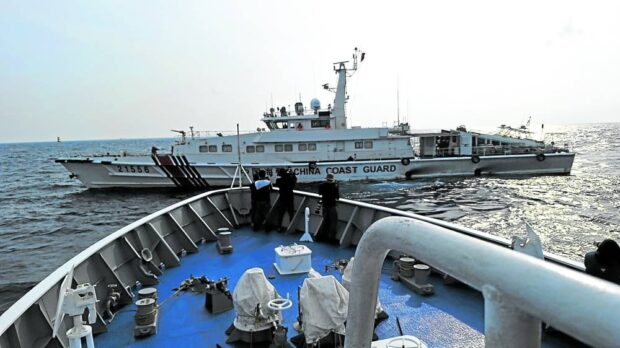
HARASSMENT The Philippine Coast Guard’s BRP Sindangan is blocked by a China Coast Guard vessel during a resupply mission to Ayungin (Second Thomas) Shoal in October. —GERALDFORD TICKE
China should first stop its hostile actions at sea before it enters into a dialogue with the Philippines, an official of the National Security Council (NSC) said on Tuesday, amid worsening tensions in the West Philippine Sea.
The territorial disputes between the two countries have grown more tense this year as Beijing seeks to assert its maritime dominance in the South China Sea.
“Dialogues can only succeed in an atmosphere of mutual respect and sincerity between two sovereign nations. The Philippines is ready to reciprocate provided that the bullying, harassment, and aggressive actions are ended immediately,” NSC spokesperson and Assistant Director General Jonathan Malaya said in a statement.
Chinese Foreign Ministry spokesperson Mao Ning on Monday said China was open to a dialogue, stressing her government was ready to work with the Philippines to handle maritime issues through negotiation and consultation.
But Mao, at the same time, asserted Beijing’s claims over nearly the entire South China Sea, including those within the 370-kilometer exclusive economic zone (EEZ) of the Philippines.
“China will not weaken in its resolve to protect its territorial sovereignty and maritime rights and interests,” she said.
“For months, the Philippines has been making provocations on Ren’ai Jiao (Ayungin Shoal) and other issues and drawing forces outside the region into those issues. China is compelled under those circumstances to take necessary measures to firmly respond to it,” she said.
Ayungin (Second Thomas) Shoal is a low-tide elevation within the Philippines’ EEZ and continental shelf, one of the country’s nine occupied features in the Kalayaan Island Group, or the Spratlys. Chinese ships have been harassing resupply vessels to BRP Sierra Madre, the grounded warship that serves as a Philippine military outpost in Ayungin.
“We welcome China’s offer of dialogue, negotiation, and consultation but for it to prosper, China must immediately stop its bullying, aggressive actions, and illegal moves in the West Philippine Sea which seriously undermine… regional peace and security,” Malaya said.
A 2016 arbitral ruling voided China’s expansive claims in the South China Sea, but Beijing has refused to recognize the decision.
Root of tensions
According to Malaya, China is “the only country that believes its own propaganda” and no single nation has expressed support for its so-called 10-dash line that supposedly defines China’s territory.
The boundaries set by China overlap into the exclusive economic zones of rival claimants like the Philippines, Brunei, Malaysia, Taiwan and Vietnam.
“The root of all these tensions is its non-adherence to international law, Unclos (United Nations Convention on the Law of the Sea), and the 2016 Arbitral Award. As the world has seen, it is not the Philippines that has been engaged in provocations, bullying and aggressive actions in the West Philippine Sea,” Malaya said.
“It is not the Philippines that has been doing laser pointing, water cannoning, dangerous maneuvers, blocking, swarming, etc. In fact, the Philippines has been very restrained and responsible but the same cannot be said of China,” he said.
Chinese activities against Philippine vessels, harassment of fishermen and other activities “that infringe… upon the Philippines’ sovereignty and jurisdiction in the West Philippine Sea are clear violations of international law,” he added.
Last week, the top diplomats of the Philippines and China spoke by telephone where they discussed the territorial disputes.
The Department of Foreign Affairs said Foreign Secretary Enrique Manalo and his Chinese counterpart, Wang Yi, “noted the importance of dialogue” in addressing the issues of concern.
Wang earlier accused the Philippines of “constantly provoking trouble at sea and undermining China’s legitimate and lawful rights.”
Domestic law
Armed Forces of the Philippines spokesperson Col. Medel Aguilar, meanwhile, said Beijing was the one “committing all the violations” at sea, in response to accusations by China’s state-controlled newspaper, the People’s Daily, that the Philippines was stirring tensions in the West Philippine Sea.
“The Philippines relies on the support of external forces, ignores China’s goodwill and restraint, and repeatedly provokes China’s principles and bottom line,” said the commentary.
But Aguilar, at the Bagong Pilipinas Ngayon program by state-run People’s Television, said: “The Philippines is not provoking conflict. We follow international law and we are only implementing our domestic law, meaning the limits of our territorial waters and exclusive economic zone where we have sovereign rights.”
He accused China of starting hostile actions that sometimes risk collisions at sea.
The Philippines, Aguilar said, is boosting its alliances and has the support of other nations because its claims are backed by international law, including Unclos. —WITH A REPORT FROM REUTERS
READ: PH, China officials agree on dialogue amid tensions